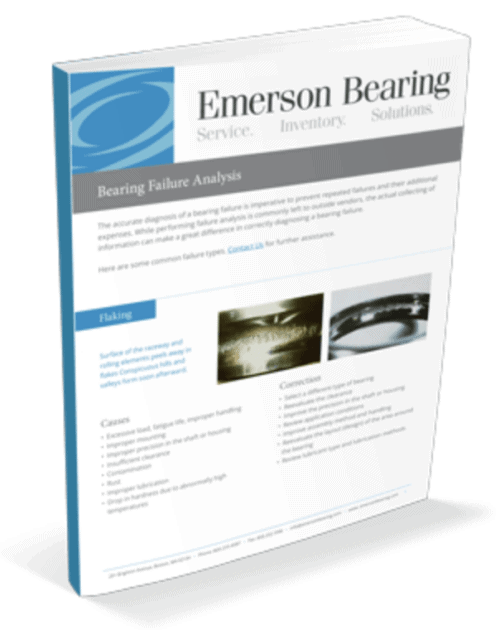Understanding Bearing Failure Analysis

Knowing more about bearing failure analysis, when it’s needed, and how to perform it can help keep your operations running and ensure you’re using the right bearing products for your application.
When Is Bearing Failure Analysis Needed?
Bearing failure analyses are conducted when customers submit bearings that have failed to us. The analysis is also done when developing or improving bearing designs and applications.
This process involves determining the main cause of the failure and how to make the necessary repairs to prevent future bearing failure, saving the time and money that operations might otherwise lose due to downtime.
According to machine designers, bearings should last for a certain number of hours based on the type of operation before experiencing normal failure. To prevent bearing failure and unscheduled downtime, it’s important to replace bearings before their expected normal life.
How to Perform a Bearing Failure Analysis
A bearing failure analysis follows these steps to gather data and identify the failure’s specific cause:
- Professionals conduct a visual examination of the bearing and assess its condition when disassembling it.
- A laboratory analysis examines oil samples and other types of particles embedded in the components.
- All relevant operating data—including bearing temperatures, oil outlet temperatures, vibration levels, and pressure levels—are evaluated.
- Experts identify any prior incidents that could have contributed to the bearing failure, along with histories of failure and recent operational changes.
- The process completes with a final analysis of the sequence of events causing the failure.
Common Reasons Why Bearings Fail
Bearing failure can occur due to numerous reasons, which we detail below.
1. Insufficient Lubrication
One common cause is a lack of lubrication, which leads to scraping between the rolling elements instead of a smooth gliding motion. This scraping generates heat that accelerates bearing failure.
2. Excessive Lubrication
Conversely, too much lubrication might allow for gliding but result in grease churning, which also produces heat and increased energy losses. As a result, internal components such as the raceway and ball bearings experience wear.
The service life of the lubricant should be matched to the service life of the bearing. For example, if a bearing has an expected life of 2,000 hours using standard grease, you can extend the life of the bearing by 10-20% if you use a higher-grade lubricant.
3. Contaminated Lubrication Causing Housing Failure
Fluid may leak into bearings if their mechanical seals experience failure. These fluids could include water and other substances that can render the bearings ineffective or unable to perform properly.
4. Internal Clearance
Bearings may also have too much or too little internal clearance that results in friction and high temperatures, eventually causing failure. Too much clearance will cause excess metal-on-metal contact and bearing overload. Too little clearance will cause shafts to wobble and prevent bearings from working as intended.
5. Overloading
Overloading may cause failure and has several potential causes, such as fluids with an unexpectedly high viscosity, pumps operating away from their curves, and the presence of solids in the pumped fluid.
6. High Temperatures
Many of the same issues that cause overloading can cause overheating of parts, to the point where the units expel lubricants and result in failure. This risk makes it important to perform temperature checks when commissioning equipment.
7. Misalignment
Components not designed to handle substantial stress may absorb uneven radial loads resulting from misalignment, leading to bearing failure.
 8. Worn Housing
8. Worn Housing
As the bearing’s housing wears down, the more room the bearing will have to move, potentially disrupting lubricant flow and leading to insufficient lubrication.
To learn more about the reasons why bearings fail and types of failures, download our comprehensive “Bearing Failure Analysis” Guide. Visuals are also included to help you gain a thorough understanding.
Importance of Proper Bearing Maintenance
Bearings remain one of the most important components to monitor with predictive maintenance. While these parts are inexpensive and smaller than other seemingly more important parts, their functionality is critical for maintaining operations. Bearings frequently experience wear because of their design and function, which means they demand more maintenance and care. Bearings need ample lubrication to maximize their service life and reduce the risk of breakdowns.
You can keep your bearings functioning and replace them regularly with a solid maintenance schedule in place. Generally, you should get preventative maintenance for bearings with the following frequencies:
- Once per month for electric motor applications
- Once per month for shaft bearings
- Once every two months for support bearings
- Twice per month for cylinder head bearings
Advantages & Benefits of Emerson’s Bearings
Industrial systems and equipment require bearings for daily operations, making it necessary to choose and maintain compatible bearings. The wrong bearings or bearing failure could lead to system breakdowns, downtime, reduced productivity, and lost profits.
At Emerson Bearing, we’re here to help you overcome all bearing challenges. We’ll help you find the right bearings for your operations at the right price and develop a delivery schedule that works best for you. We provide our customers with the bearings they need through our World Wide Sourcing Network, and we offer a range of added services, including OEM parts interchanges, OEM and MRO expertise, same-day shipping, and 24/7 customer support.
Prevent Bearing Failure With Emerson Bearing
For an extensive selection of high-quality bearings and bearing services, trust the experts at Emerson Bearing. Download our eBook, “Bearing Failure Analysis”, to learn more about the benefits of this important practice. Contact us today for more information about our products and services.


















